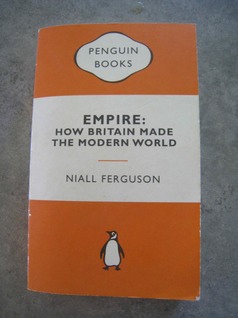Sunday, 30 November 2008

The same book shop visit that led me to Dark Star Safari also yielded Niall Ferguson’s Empire: How Britain Made The Modern World.
The subject of empires and how they develop was exercising my mind at the time (in connection with another writing project) and a tenner for a historical survey of the development and decline of the British Empire seemed like a worthwhile investment.
When I started reading, I discovered that in reality the book is a history of globalization as promoted by Great Britain and her colonies and that while your mileage may vary Ferguson regards the events he’s describing as undoubtedly A Good Thing with very little in the way of down sides.
Ferguson’s list of the features and institutions* exported through British imperialism is certainly impressive. Many of them, however, seem noticeably absent in Theroux’s travels through most of Africa and those that have survived in Zimbabwe seem to be in serious and very real danger.
There’s no doubt that the Age of Imperialism in the late nineteenth and early twentieth centuries was ushered in by British expansion across the seas, their consolidation of the colonies in North America and the elimination of any major conflicting interests from the Indian sub-continent.
In all of those areas, and in the colonies of settlement established in Australia, New Zealand and South Africa those features have survived, more or less, intact. The areas Theroux travelled through were, largely, the last of Britain’s imperial acquisitions and it’s hardly surprising that, in the relatively short time they were there, the British were largely unsuccessful in transplanting the same benefits.
* Listed on p. xxiii of the book as:
1. The English language
2. English forms of land tenure
3. Scottish and English banking
4. The Common Law
5. Protestantism
6. Team sports
7. The limited or ‘night watchman’ state
8. Representative assemblies
9. The idea of liberty